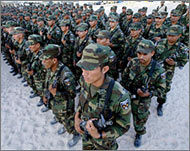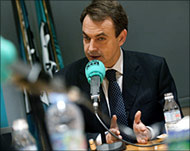Honduran troops will also leave Iraq
In a blow to President George Bush and his occupation partners in Iraq, Honduras followed Spain on Monday in announcing it will pull its troops out of the country.

President Ricardo Maduro, a close ally of the United States, said he had already told “coalition countries” that Honduras’ 370 soldiers in Iraq would soon quit the country.
He said in a television and radio address the withdrawal would be carried out “in the shortest possible time and under safe conditions for our troops”.
Honduras said earlier on Monday it was considering the withdrawal due to spiraling violence and pressure created by Spain’s decision to pull its forces out.
Spain is commanding troops in Iraq from other Spanish-speaking nations in the occupation alliance – Honduras, El Salvador, Nicaragua and the Dominican Republic.
Honduran soldiers were sent to Iraq last summer as peacekeepers only, and have been clearing mines and providing medical care in central Iraq.
They had previously been set to leave when their mandate expires in July.
Troops’ safety
 |
|
El Salvador will keep its troops in |
Many Hondurans have questioned why their troops should remain in Iraq now that Spain was withdrawing and congressional leaders had voiced concern for the troops’ safety.
El Salvador said it will keep its 300 soldiers in Iraq until the start of August, the end of its scheduled stay.
“We are going to fulfil the pledge we have made,” presidential spokesman Carlos Flores said. He did not say what would happen beyond early August. El Salvador’s conservative president-elect, Tony Saca, takes office on 1 June.
In Washington, US State Department spokesman Richard Boucher said on Monday each country in the US-led occupation would make “individual decisions” whether to stay in Iraq as conditions there change.
Boucher said he believed there was no change in the status of troops from Nicaragua, another US ally in Central America which has sent troops to Iraq.
Nicaraguan troops came home earlier this year as part of a normal rotation but a new contingent has not been sent to Iraq because the government says it is short of cash.
Spanish withdrawal
Meanwhile, the process of withdrawing Spanish troops from Iraq has begun and will be completed in less than six weeks, Spain’s new government said on Monday.
 |
|
Zapatero announced Spain’s |
Defence Minister Jose Bono said he would not give dates for the troop pullout for security reasons. But when asked at a news conference about a reported estimate of the time needed for withdrawal, Bono said: “Whoever said six to eight weeks was being imprudent because it will be less.”
A military plane left on Monday with troops and equipment to help carry out the withdrawal, Bono said. Originally that flight was to have been for a routine troop rotation. State television said 194 soldiers were on board.
‘Shortest time’
Jose Luis Rodriguez Zapatero, sworn in as Spain’s prime minister on Saturday, announced on Sunday he had given orders for Spain’s 1400 troops in Iraq “to come home in the shortest possible time and the greatest possible safety”.
Zapatero said he was making good on a longstanding campaign promise to bring home the troops unless the United Nations took charge there politically and militarily by 30 June.
He said he took his decision so soon because consultations with UN and world leaders showed there was no way a UN mandate meeting Spain’s conditions was possible.
Zapatero ousted a strongly pro-American party in elections held three days after the 11 March train bombings in Madrid that killed 191 people.
Bush expressed regret on Monday to Zapatero over the decision.